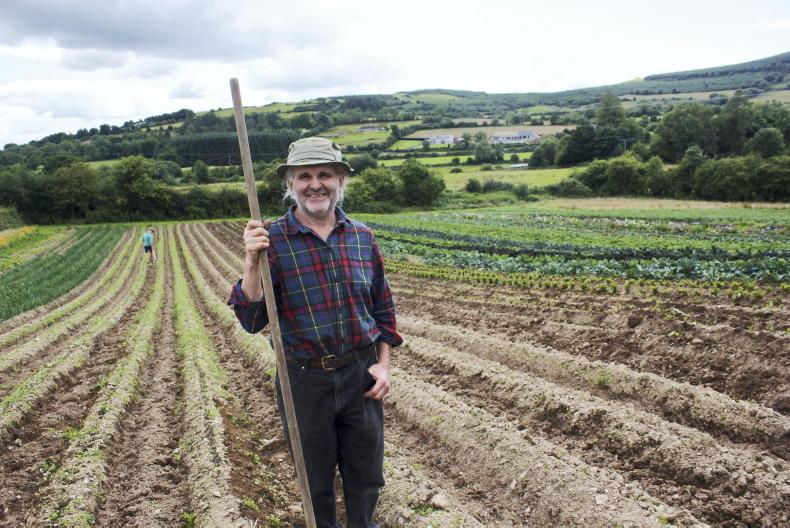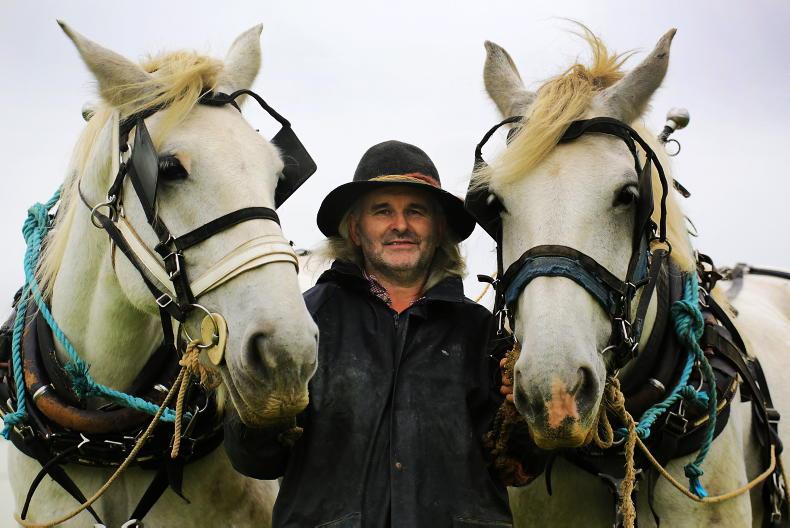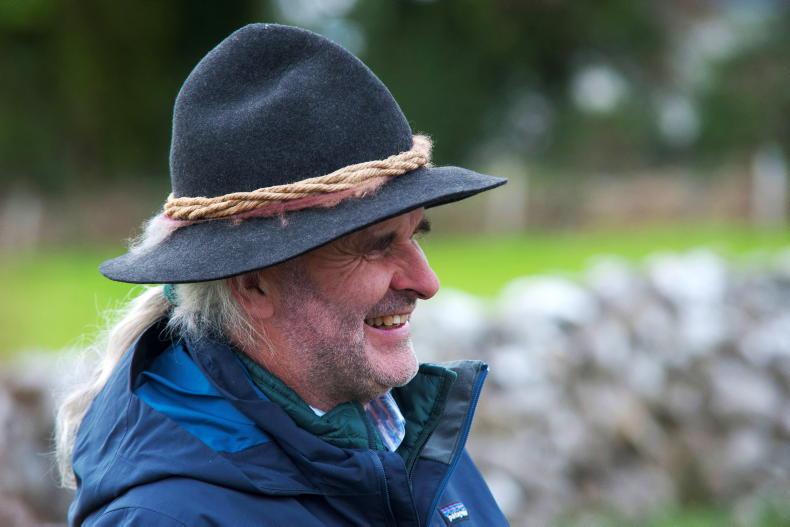Driving past the farm of this year’s Farming for Nature winner Jim Cronin, outside Killaloe, you’d be forgiven for thinking you’d taken a very wrong turn and ended up on the type of horticulture enterprise usually seen in a much warmer climate. Row upon row of vibrant, colourful vegetables light up the green landscape.
Cabbage, kale, potatoes and lots, lots more all tilled and rowed neatly with either a small tractor or horse and plough plus a few cosmos and marigolds to attract pollinators.
Jim says the cosmos look pretty and when he looks across his farm, he wants to make sure it looks nice as well as functions.

Jim Cronin has a 16ac organic market garden farm in Co Clare. \ David Ruffles
As a young man he spent time in Holland and returned home to Ireland to work in commercial horticulture.
“I remember we had just harvested 12,000t of carrots and I was sitting on the headland asking myself how you could possibly make this pay long term and make a living from it. I was 21 years old at the time and could see the numbers just weren’t adding up,” Jim said.
Nevertheless, having grown up on a smallholding himself, he was determined to one day have a farm of his own. He spotted an advertisement for 16ac of land in Co Clare 32 years ago and has been organic farming there ever since.
He laughs, warmly remembering the surprise his new neighbours got when they found out what kind of farming he’d be doing. The advice at the time was to plant Sitka spruce on the land. But word spread and the quality of his produce ensured he built up a trade supplying directly to customers. On top of vegetables, he also keeps some suckler cows and horses.
Hippy farming
Farming for nature can be dismissed by some as a hippy brand of farming that might be nice for the environment but will leave farmers with a tight profit margin.
Jim’s style of farming disabuses this theory and he’s proud of ensuring a farm turnover which has enabled him to raise a family on the farm without any subsidies.
“I received a basic payment cheque from the Department of Agriculture and sent it back,” Jim laughs. He was determined to make the farm pay for itself.

Jim Cronin and Moss Trant competing in the Special Horse class at the 2014 National Ploughing Championships at Ratheniska, Co Laois.
As well as outdoor crops he also has a number of polytunnels and he has an expectation of making €1,200 per vegetable bed in a polytunnel each year. With at least nine beds in each polytunnel that means an income of at least €10,800/year.
Multiply this by the number of polytunnels he has and you realise it is a far cry from the average income of most suckler farmers at around €8,000/year.
SuperValu supplier
After a spring storm disrupted their supply chain three years ago, SuperValu in Killaloe approached Jim to ask him to supply them with his stock. He confesses he was “cautious” of entering into business with a supermarket but the arrangement has worked well and Jim is proud to have his own small section of the shop set aside for his produce.

Jim Cronin at the second day of the National Ploughing Championships, Screegan, Tullamore, back in 2014. \ Valerie O’Sullivan
He also runs courses and is well-known among the organic farm community for the depth of his knowledge and expertise on soil health.
Jim says he is deeply honoured to receive the Farming for Nature award and says that somehow he always knew that more traditional farming practices would return to favour. He would love to see more farmers take up small-scale horticulture but feels a lack of knowledge and education prevents them.
Jim’s advice for anyone entering farming is simple: “Make a plan for your farm and make sure you love it.”
Driving past the farm of this year’s Farming for Nature winner Jim Cronin, outside Killaloe, you’d be forgiven for thinking you’d taken a very wrong turn and ended up on the type of horticulture enterprise usually seen in a much warmer climate. Row upon row of vibrant, colourful vegetables light up the green landscape.
Cabbage, kale, potatoes and lots, lots more all tilled and rowed neatly with either a small tractor or horse and plough plus a few cosmos and marigolds to attract pollinators.
Jim says the cosmos look pretty and when he looks across his farm, he wants to make sure it looks nice as well as functions.

Jim Cronin has a 16ac organic market garden farm in Co Clare. \ David Ruffles
As a young man he spent time in Holland and returned home to Ireland to work in commercial horticulture.
“I remember we had just harvested 12,000t of carrots and I was sitting on the headland asking myself how you could possibly make this pay long term and make a living from it. I was 21 years old at the time and could see the numbers just weren’t adding up,” Jim said.
Nevertheless, having grown up on a smallholding himself, he was determined to one day have a farm of his own. He spotted an advertisement for 16ac of land in Co Clare 32 years ago and has been organic farming there ever since.
He laughs, warmly remembering the surprise his new neighbours got when they found out what kind of farming he’d be doing. The advice at the time was to plant Sitka spruce on the land. But word spread and the quality of his produce ensured he built up a trade supplying directly to customers. On top of vegetables, he also keeps some suckler cows and horses.
Hippy farming
Farming for nature can be dismissed by some as a hippy brand of farming that might be nice for the environment but will leave farmers with a tight profit margin.
Jim’s style of farming disabuses this theory and he’s proud of ensuring a farm turnover which has enabled him to raise a family on the farm without any subsidies.
“I received a basic payment cheque from the Department of Agriculture and sent it back,” Jim laughs. He was determined to make the farm pay for itself.

Jim Cronin and Moss Trant competing in the Special Horse class at the 2014 National Ploughing Championships at Ratheniska, Co Laois.
As well as outdoor crops he also has a number of polytunnels and he has an expectation of making €1,200 per vegetable bed in a polytunnel each year. With at least nine beds in each polytunnel that means an income of at least €10,800/year.
Multiply this by the number of polytunnels he has and you realise it is a far cry from the average income of most suckler farmers at around €8,000/year.
SuperValu supplier
After a spring storm disrupted their supply chain three years ago, SuperValu in Killaloe approached Jim to ask him to supply them with his stock. He confesses he was “cautious” of entering into business with a supermarket but the arrangement has worked well and Jim is proud to have his own small section of the shop set aside for his produce.

Jim Cronin at the second day of the National Ploughing Championships, Screegan, Tullamore, back in 2014. \ Valerie O’Sullivan
He also runs courses and is well-known among the organic farm community for the depth of his knowledge and expertise on soil health.
Jim says he is deeply honoured to receive the Farming for Nature award and says that somehow he always knew that more traditional farming practices would return to favour. He would love to see more farmers take up small-scale horticulture but feels a lack of knowledge and education prevents them.
Jim’s advice for anyone entering farming is simple: “Make a plan for your farm and make sure you love it.”









 This is a subscriber-only article
This is a subscriber-only article










SHARING OPTIONS: